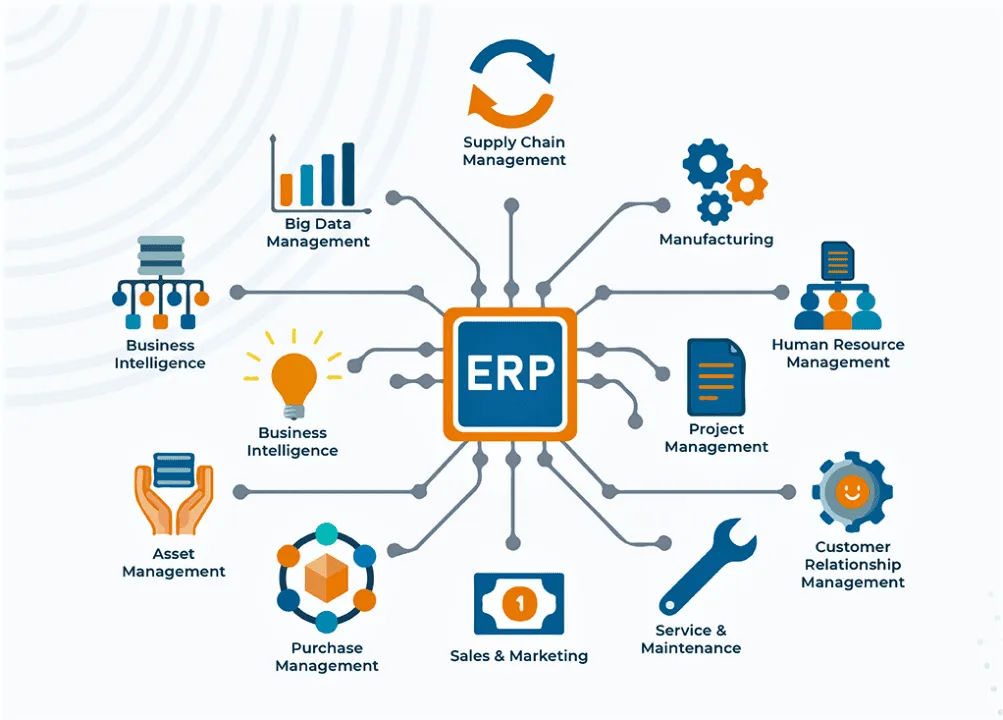What is ERP
Enterprise resource planning (ERP) is a software system that allows you run your entire business, helping automation and processes in finance, human resources, manufacturing, supply chain, services, procurement
8 Reasons Why ERP is Essential
- Save Money
- Improve Collaboration
- Deliver More valid Analytics
- Increase Productivity
- Enhance Customer Fulfillment
- Simplify Compliance and Shows Risk Management
- Improve Inventory Tracking
- Boost Production Planning and Resource Management
1. Save Money
ERP utilizes centralization for various systems . From product development to accounts payable, your staff can access all the essential tools from one centralized system.
By centralizing systems, you allow your employees use their time more effectively. With ERP, users don’t have to search a piece of data across different systems. With the central database, information is much easier to regain.
Moreover, organization saves money with ERP by stopping user training on various systems.
2. Improve Collaboration
Centralization also contains the importance of ERP. Modules differ slightly relying on your program, but generally, all systems enhance collaboration in some way. The compact database is an essential part of what makes an ERP unique.
Moreover, ERP uses a central database to reduce any uncertainty or delaying during projects since all team members can access the company-wide data they need. There’s no need to combine information across various systems or sources.
3. Deliver More valid Analytics
A central database of information also helps in enhancing your analytics and reporting. One of many other uses of ERP contains recording and storing inputted data, creating this system an amazing BI tool.
As long as your vendor supplies strong functionality, ERP software makes developing several reports easier. Create reports that could take days of research and compilation without an ERP in minutes
4. Increase Productivity
An ERP can automate your numerous monotonous assignments if you choose the proper solution. The database within ERP software eliminates redundant tasks such as entry and allows the system to perform advanced calculations within minutes.
Automation, one of many uses of ERP, team members have time to do more thoughtful work,hence ROI increases regarding labor. From this, ERP boosts your organization’s profit and productivity
5. Enhance Customer Fulfillment
Providing client-centered goods and services with the correct client satisfaction tools is the best way to enhance client retention. ERP gives these results in a few various ways.First, most ERPs are equipped with CRM tools or can easily combine with them. With an ERP, your CRM has access to data across business functions.Along with contact details, an integrated CRM can show you elements such as order history and billing details. This knowledge allows your team to see your customers more holistically to comprehend their wants and needs more profoundly.
6. Simplify Compliance and Shows Risk Management
As companies expand and do business in various countries, tracking all the regulations set on your business can be difficult. Local companies must also concern about environmental, information security and human resources constraints. Luckily, many ERP are created with these regulations to assist you keep compliance at each phase. Moreover, ERP software gives built-in auditing tools to document chemical use, tax provisions and other components. Compliance and risk management tools make it extremely easy to prepare reports and deliver them to the suitable governing body. This solution’s enhanced reliability and accuracy improve financial management and reduce bookkeeping mistakes.
7. Improve Inventory Tracking
A important challenge for developing companies is tracking and monitoring their expanding inventory levels. ERP uses barcoding, RFID tags and serial numbers to keep tabs on your inventory at each stage during the supply chain.Inventory management tools allow you keep track of inventory levels at various warehouses, which things are in transportation and which things are on the shelves prepared for customers.
8. Boost Production Planning and Resource Management
ERP can also handle manufacturing workflows. Manufacturing ERP delivers insight into all production, warehousing, inventory and shop floor operations. In-depth monitoring permits users to optimize production plans, equipment and labor to maximize capacity.



Add a Comment